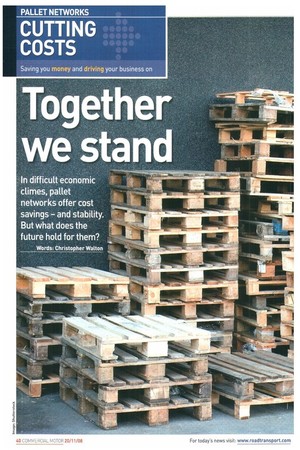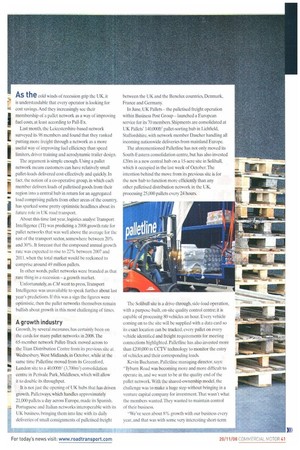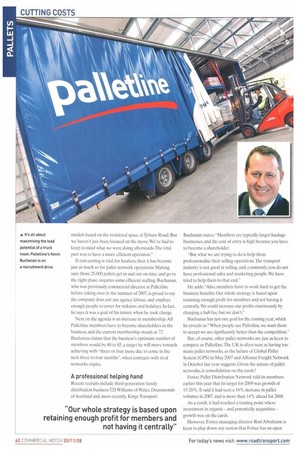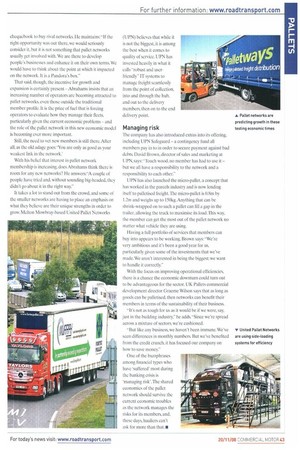CUTTING COSTS
Page 40

Page 41

Page 42

Page 43

If you've noticed an error in this article please click here to report it so we can fix it.
Together
we stand In difficult economic climes, pallet Y.,networks offer cost savings and stability. But what does the future hold for them?
Words: Christopher Walton As the cold winds of recession grip the UK, it is understandable that every operator is looking for cost savings. And they increasingly see their membership of a pallet network as a way of improving fuel costs, at least according to Pall-Ex.
Last month, the Leicestershire-based network surveyed its 98 members and found that they ranked putting more freight through a network as a more useful way of improving fuel efficiency than speed limiters, driver training and aerodynamic trailer design. The argument is simple enough. Using a pallet network means customers can have relatively small pallet-loads delivered cost-effectively and quickly. In fact, the notion of a co-operative group, in which each member delivers loads of palletised goods from their region into a central hub in return for an aggregated load comprising pallets from other areas of the country, has sparked some pretty optimistic headlines about its future role in UK road transport.
About this time last year, logistics analyst Transport Intelligence (TI) was predicting a 2008 growth rate for pallet networks that was well above the average for the rest of the transport sector, somewhere between 20% and 30%. It forecast that the compound annual growth rate was expected to rise to 22% between 2007 and 2011, when the total market would be reckoned to comprise around 49 million pallets.
In other words, pallet networks were branded as that rare thing in a recession — a growth market. Unfortunately, as CM went to press, Transport Intelligence was unavailable to speak further about last year's predictions. If this was a sign the figures were optimistic, then the pallet networks themselves remain bullish about growth in this most challenging of times.
A growth industry
1 Growth, by several measures, has certainly been on the cards for many pallet networks in 2008.The 65-member network Pallet-Track moved across to the Titan Distribution Centre from its previous site at Wednesbury, West Midlands, in October, while at the same time Palletline moved from its Greenford, London site to a 40,000ft (3,700m2) consolidation centre in Perivale Park, Middlesex, which will allow it to double its throughput.
It is not just the opening of UK hubs that has driven growth. Palletways, which handles approximately 21,000 pallets a day across Europe, made its Spanish. Portuguese and Italian networks interoperable with its UK business, bringing them into line with its daily deliveries of small consignments of palletised freight between the UK and the Benelux countries, Denmark, France and Germany.
In June, UK Pallets — the palletised freight operation within Business Post Group — launched a European service for its 70 members. Shipments are consolidated at UK Pallets' 140,000ft2 pallet-sorting hub in Lichfield, Staffordshire, with network member Dascher handling all incoming nationwide deliveries from mainland Europe.
The aforementioned Palletline has not only moved its South-Eastern consolidation centre, but has also invested £20m in a new central hub on a 15-acre site in Solihull, which it occupied in the last week of October. The intention behind the move from its previous site is for the new hub to function more efficiently than any other palletised distribution network in the UK, processing 25,000 pallets every 24 hours.
The Solihull site is a drive-through, side-load operation, with a purpose-built, on-site quality control centre; it is capable of processing 80 vehicles an hour. Every vehicle coming on to the site will be supplied with a data card so its exact location can be tracked, every pallet on every vehicle identified and freight requirements for meeting connections highlighted. Palletline has also invested more than £200,000 in CCTV technology to monitor the entry of vehicles and their corresponding loads.
Kevin Buchanan, Palletline managing director, says: —Tyburn Road was becoming more and more difficult to operate in, and we want to be at the quality end of the pallet network. With the shared-ownership model, the challenge was to make a huge step without bringing in a venture capital company for investment. That wasn't what the members wanted. They wanted to maintain control of their business.
"We've seen about 8% growth with our business every year, and that was with some very interesting short-term models based on the restricted space at Tyburn Road. But we haven't just been focused on the move. We've had to keep in mind what we were doing afterwards. The vital part was to have a more efficient operation."
If cost-cutting is vital for hauliers, then it has become Just as much so for pallet network operations. Making sure those 25,000 pallets get in and out on time, and go to the right place, requires some efficient staffing. Buchanan, who was previously commercial director at Palletline before taking over in the summer of 2007, is proud to say the company does not use agency labour, and employs enough people to cover for sickness and holidays. In fact, he says, it was a goal of his tenure when he took charge.
Next on the agenda is an increase in membership. All Palletline members have to become shareholders in the business, and the current membership stands at 72. Buchanan claims that the business's optimum number of members would be 80 to 85,a target he will move towards achieving with "three or four more due to come in the next three to four months", when contracts with rival networks expire.
A professional helping hand
Recent recruits include third-generation family distribution business TD Williams of Wales, Drummonds of Scotland and, most recently, Kings Transport. Buchanan states: "Members are typically larger haulage businesses, and the cost of entry is high because you have to become a shareholder.
-But what we are trying to do is help them professionalise their selling operations. The transport industry is not good at selling, and, commonly, you do not have professional sales and marketing people. We have tried to help them to that end."
He adds: "Also, members have to work hard to get the business benefits. Our whole strategy is based upon retaining enough profit for members and not having it centrally.We could increase our profits enormously by charging a hub fee, but we don't."
Buchanan has just one goal for the coming year, which he reveals as: "When people see Palletline, we want them to accept we are significantly better than the competition."
But, of course, other pallet networks are just as keen to compete as Palletline. The UK is often seen as having too many pallet networks, as the failure of Global Pallet System (UPS) in May 2007 and Alliance Freight Network in October last year suggests. Given the nature of pallet networks, is consolidation on the cards?
Fortec Pallet Distribution Network told its members earlier this year that its target for 2009 was growth of 15-20%. It said it had seen a 16% increase in pallet volumes in 2007, and is more than 14% ahead for 2008.
As a result, it had reached a turning point where investment in organic and potentially acquisitive growth was on the cards, However, Fortec managing director Rod Abrahams is keen to play down any notion that Fortec has an open chequebook to buy rival networks. I le maintains: "If the right. opportunity was out there, we would seriously consider it, but it is not something that pallet networks usually get involved with. We are there to develop people's businesses and enhance it on their own terms. We would have to think about the point at which it impacted on the network. It is a Pandora's box."
That said, though, the incentive for growth and expansion is certainly present —Abrahams insists that an increasing number of operators are becoming attracted to pallet networks, even those outside the traditional member profile. It is the price of fuel that is forcing operators to evaluate how they manage their fleets, particularly given the current economic problems — and the role of the pallet network in this new economic model is becoming ever more important.
Still, the need to vet new members is still there. After all, as the old adage goes: 'You are only as good as your weakest link in the network: With his belief that interest in pallet network membership is increasing, does Abrahams think there is room for any new networks? He answers:"A couple of people have tried and, without sounding big-headed, they didn't go about it in the right way."
It takes a lot to stand out from the crowd, and some of the smaller networks are having to place an emphasis on what they believe are their unique strengths in order to grow. Melton Mowbray-based United Pallet Networks (UPN) believes that while it is not the biggest, it is among the best when it comes to quality of service. UPN has invested heavily in what it calls "robust and userfriendly" IT systems to manage freight seamlessly from the point of collection, into and through the huh, and out to the delivery members, then on to the end delivery point.
Managing risk
The company has also introduced extras into its offering, including UPN Safeguard — a contingency fund all members pay in to in order to secure payment against bad debts. David Brown, director of sales and marketing at UPN, says; "Touch wood, no member has had to use Abut we all have a responsibility to the network and a responsibility to each other."
TIM has also launched the micro-pallet, a concept that has worked in the parcels industry and is now lending itself to palletised freight. The micro-pallet is 0.8m by 1.2m and weighs up to 150kg. Anything that can be shrink-wrapped on to such a pallet can fill a gap in the trailer, allowing the truck to maximise its load."11ils way, the member can get the most out of the pallet network no matter what vehicle they are using.
Having a full portfolio of services that members can buy into appears to be working. Brown says: "We're very ambitious and it's been a good year for us, particularly given some of the investments that we've made. We aren't interested in being the biggest; we want to handle it correctly."
With the focus on improving operational efficiencies, there is a chance the economic downturn could turn out to be advantageous for the sector. UK Pallets commercial development director Graeme Wilson says that as long as goods can be palletised. then networks can benefit their members in terms of the sustainability of their business.
"It's not as tough for us as it would be if we were, say, just in the building industr■,,," he adds. "Since we're spread across a mixture of sectors. we're cushioned.
"But like any business, we haven't been immune. We've seen differences in monthly numbers. But we've benefited from the credit crunch, it has focused our company on how to save money."
One of the buzzphrases among financial types who have 'suffered' most during the banking crisis is 'managing risk'. The shared economies of the pallet network should survive the current economic troubles as the network manages the risks for its members, and, these days, hauliers can't ask for more than that. •




























































































































































